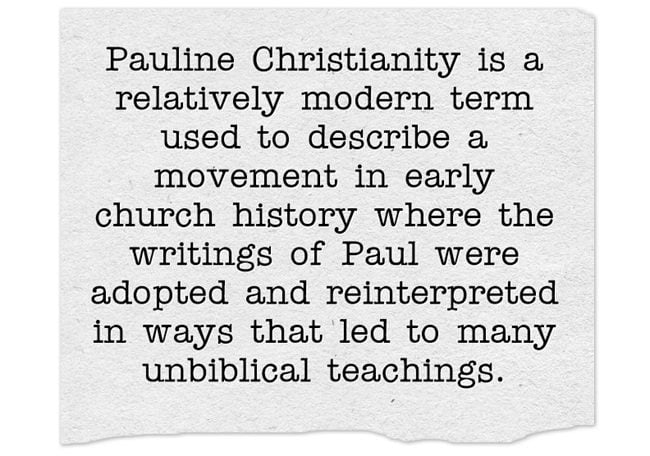In Christian circles, many of us have a habit of labeling people or groups of people with terms that help us identify who they are. Sometimes these labels are used as a theological descriptor and sometimes they are used as a way to label others. In the case of Pauline Christianity the same is true. This conflict in terms makes it necessary to understand what does Pauline Christianity mean?
Where did Pauline Christianity originate?
Pauline Christianity was first referred to in the 20th century by scholars who noted historical references from the second century to differences in the teachings of Paul with the teachings of Jesus. These differences were attributed as being the foundations of Christian Gnosticism, which is a pagan version Christianity that came into popularity in the region of Antioch, Syria.
How is Pauline Christianity described?
Paul’s “version” of Christianity was adopted by St. Ignatius of Antioch who was a student of Paul. Ignatius was instrumental according to many of being responsible for promoting a liberal view of Christianity that was anti-Jewish in flavor while embracing the elevation of other versions of Christianity. Many believe that Ignatius was influenced by Paul’s teachings against “Judaizers” who were responsible for teaching Christians they must keep the law (Acts 15:1-35; Galatians 1-4).
Out of this anti-Jewish sentiment, many others embraced pagan teachings that they attributed to the teachings of Paul. Catholic tradition teaches that Ignatius rejected these teachings, which led to him being put to death by Roman Emperor Trajan (A.D. 98-117). Likewise, the Catholic Church considers his writings to be the foundation of many doctrines of Catholic Church (1). A majority of these doctrines are considered to be heretical by most Christians.
Is Pauline Christianity Biblical?
If Pauline Christianity is defined based on sources outside of Scripture, then the answer is a definite no. An entire book can be written on why. However, if Pauline Christianity is based on the 13 books (14 if you count Hebrews) in the New Testament, then the answer is a definite yes. However, there are still those who believe that Paul’s writings are contrary to the teachings of Jesus.
Those who oppose inclusions of Paul’s letters in the New Testament do so for a variety of reasons. As mentioned previously, Paul’s teaching against Judaizers is one reason of which many consider to be contrary to the writings of James and Peter. However, when looking Paul’s writings in light of the basic rules of Biblical study and interpretation, there is no doubt that Paul’s teachings are Biblical (2).
Another complaint about Paul’s writings is that he often teaches things that are not mentioned anywhere else in Scripture. One such area he is criticized for in not teaching about the Kingdom as Jesus had taught. This has to be seen in the light of who Paul’s audience was. Before Paul’s conversion, he was an enemy of Christians, persecuting them as a zealous Jewish Pharisee. After His conversion, he tried to minister to his people, but was mostly rejected so he “shook the dust of his feet.” With this rejection, Paul took his message to the gentile Greeks as he was led by the Holy Spirit (Acts 13:32-52).
With this new ministry focus, Paul explained Christianity in a way that was less Jewish because Judaism was foreign to a large number of Greeks. Gentiles could not relate to being taught about the coming Kingdom the way Jews had known about for thousands of years. They did not see Jesus as a Jewish Messiah, they saw Him as someone who loved them and died for their sins.
Another criticism of Paul by many is that He rarely quoted Jesus (1 Corinthians 11:23-25; 1 Corinthians 14:37-38). A review of the book of Acts shows that after the resurrection, Peter primarily took the gospel to the Jews in and around Jerusalem (Acts 1-12). After Paul’s conversion (Acts 9) he started preaching the gospel to Jews, which infuriated them so much they wanted to kill him so he went to Jerusalem to meet with the Apostles.
When he arrived in Jerusalem, the Apostles were afraid to see him until Barnabas took Paul to them and explained how Paul was saved and was boldly preaching in the name of Jesus. Barnabas’ testimony convinced the Apostles to accept Paul as a brother and send him home to Tarsus to preach. This began Paul’s ministry as a missionary evangelist and church planter.
What we do see with Paul’s teachings and writings is he taught the truth of doctrine in a way that had a logical life application. Because of this, Paul’s writings demonstrate how one can take the Word of God and use it to minister to non-believers in a way that meets their needs and leads to their trusting of Christ for salvation (1 Corinthians 9:19-23; 1 Corinthians 10:33). Likewise, Paul’s writings offer wisdom and encouragement to believers who are struggling with their faith and overcoming sin.
Conclusion
Pauline Christianity is a relatively modern term used to describe a movement in early church history where the writings of Paul were adopted and reinterpreted in ways that led to many unbiblical teachings. This led to many believing that Paul’s doctrine was not the same doctrine as Jesus’. Part of the reason for this belief was Paul’s preaching against Judaizers to a primarily Gentile audience and rare quoting of Jesus, amongst other things. The reinterpretation of Paul’s writings mixed with paganism was the foundation of Christian Gnostic teaching as well as other teachings that most Christians would find objectionable.
 Article By Dr. Michael Williams
Article By Dr. Michael Williams
Dr. Michael L. Williams is a pastor, author, Christian educator and Biblical counselor who has served in ministry since March of 2000. Dr. Mike holds under-graduate through post graduate degrees in Christian Education and formerly worked as a nurse. Dr. Mike is the Senior Pastor of Selah Mountain Ministries, which he founded in March of 2010 in Albuquerque, New Mexico, USA (selahmountain.org). In addition to counseling, he teaches how to overcome life issues Biblically on topics such as anger management, marriage, addictions, and other subjects typically referred to as mental illnesses. Dr. Mike is also a writer at What Christians Want To Know. Dr. Mike lives with his wife Pamela Rose and adult daughter Hollie Rose. He and Pamela have other adult children and several grandchildren as well. Learn more about Dr. Mike at his personal ministry web site Wisdom4Today
Resources – Scripture quotations are from The Holy Bible, King James Version. (1 ) Joyce, G. (1908). The Church. In The Catholic Encyclopedia. New York: Robert Appleton Company. Retrieved December 14, 2014 from New Advent: http://www. newadvent. org/cathen/03744a.htm. (2) Williams, Michael, (2013). How to study/Introduction to the Bible. Albuquerque, NM: Selah Mountain Bible Institute.












